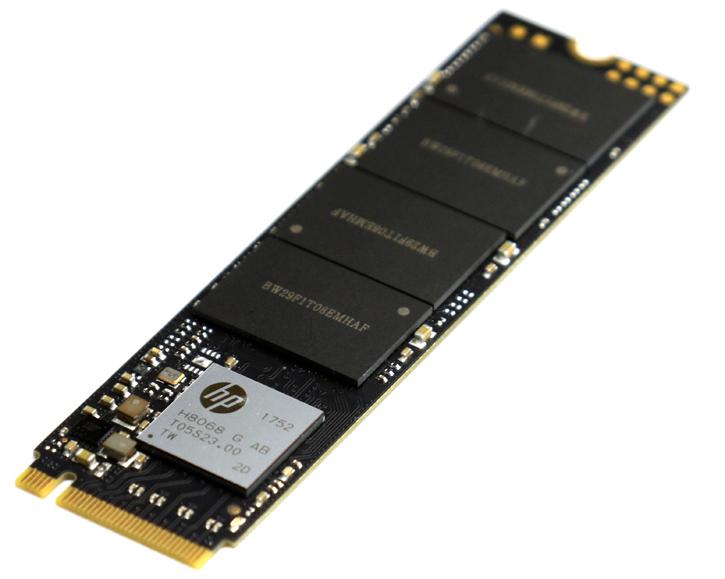Final Words & Conclusion
Final Words & Conclusion
A DRAMless cache design SSD in the year 2018, that normally is batpoop crazy stuff! When I received this SSD I was totally and utterly skeptical about it. The HP SSD EX900 M.2 Series, however, uses a PCIe-to NAND controller called HP 8068, and that controller really is the Silicon Motion (SM2263XT). The SM2263XT might be a DRAM-less drive, but if you run Windows 10 (latest Fall Creators Update required) Host Memory Buffer technology kicks in, a small chunk of your system memory substitutes the memory of the drive to cache the map table.
The SSD stripped from a DRAM cache equals a nice price reduction. The performance, however, did not disappoint even slightly. Reads wise this unit can keep up with enthusiast class NVMe SSDs, writes are a little ickier here and there, but still twice to triple of that compared to a regular SATA3 SSD. So I am inclined to be very positive here, however, there is one strong side-note we need to make, the SSD might be cheaper with the DRAM cacheless design, but part of your system memory is used for that, and sure you pay money for your system memory as well right. DDR4 memory sells at roughly 12 EUR/USD per GB. This 500GB SSD uses 512MB of your memory as fast horst cache, realistically and virtually you need to add a price tag of 6 EUR/USD to this SSD. Now I think that is a small price to pay as long as you can spare that 512MB of DDR4 memory overall, ergo this new approach might be extremely cost-effective. But again, Windows 10 is mandatory, patched and updated to the latest revision.
The results mean that this massively fast performing M.2. unit costs ~30 cents per GB, so that is 150 bucks for the 500GB model. Not bad huh? Performance wise with some very small exceptions, the HP EX900 500GB did manage to impress me, especially when looking at overall performance averaged out over all types of workloads, this SSD averages out incredibly well. The new 64-layer Vertically stacked TLC written NAND in combination with the HP H8068/SM2263XT controller, reveal speeds at 2GB/s reads sometimes even closing in at 3 GB/s in specific workloads with close to 1.5 GB/s in writes. The development rate and curve of current NVMe and regular NAND flash-based storage technologies are simply breathtaking. very exciting.
Nearly 10 years ago in 2008 that we reviewed the first SSD. It was 32GB and would cost you 349 USD. The read performance was ~150MB/sec at the time, which was just staggering. It had no cache and connected to a regular SATA connector. How things have changed from that ' blisteringly fast' 150 MB/sec towards numbers that are 20 to 30 fold of that whilst offering more capacity, reliability, endurance, and performance. Prices have been coming down, reliability has been top notch and ever so importantly volume sizes have moved upwards to a level where now 1TB SSDs are getting a norm slowly. The current new mainstream is roughly 512GB which offers a nice balance in between performance and value. HP did not even bother to fab a 128GB version, as for most consumers that want the NVMe experience that is just a too small volume size to work with. Now, I have stated it a number of times already, I really would like to see motherboards to design and make move to SATA4, rapidly, to be able to keep up with M2 form factors and the NVMe protocol. This SSD offers seriously fast performance in both reads and writes relative to what you pay for it. At just over 1 or even 2 GB/s writes per seconds it is easily three times faster compared to that mainstream SATA3 SSD, while topping 3 GB/s reads (!) and thus over quadrupling that number compared to a SATA3 SSD. Combined with a 3-year warranty you should be good to go for a long time. The TBW written values are fine as well, 200 TB written for this 500 GB model, 200TB for the 250GB unit and 70 TBW for the smallest 120GB version.
Performance
The new storage units are fast and strong, on all levels really, random 4K IOPS performance is good, over 200K. This SSD writes and reads serious amounts of tiny files in a very fast fashion. We stated it before though, IOPS is not something you as a consumer should worry about too much unless you are doing a lot of database related work or create similar workloads on your PC, but this SSD certainly ranks high within this aspect. Trace testing - we feel that one of the best tests in our entire benchmark suite is PCMark Vantage 64-bit. This is a trace test and can emulate what you guys do on your PC but then multiplied by a factor of 100, this test puts more focus on read performance opposed to writing though. The outcome of the results with the SSD is good. Sustained read / write performance, again excellent as advertised. Read performance in particular leads and is top ranking. Overall the series is impressive. Zoom in at both IOPS and trace performance and you'll notice that the SSD can manage serious workloads without breaking so much as a drop of sweat. So whether you write lots of small files, copy big MKV movies or do it all together.
Pricing & Warranty
HP can keep prices veru competitive, but obviously a unit this fast is more expensive opposed to a regular SATA3 SSD. For the bigger volume sizes expect prices in the ~30 Cents per GB range. So we expect to see something in the 150 USD range for this 500 GB model, but that might vary a bit based on region and industry demand. Any SSD is enjoyable, very much so. If you put a drive like this into your compatible PC, you'll have no idea what is about to hit you. We very much enjoy the grand sustained performance of this SSD series; if you copy a vast amount of compressed data, then the SSD will perform seriously fast in performance. Make no mistake, replacing an HDD with an SSD in your PC eliminates the random access lag of the HDD head, it is no longer mechanical. That combined with the performance SATA3 / M.2 / mSATA offers these days is simply a massive difference and probably the best upgrade you can make for your computer anno 2018. HP will give you a 3-year warranty period, a little less than we had hoped for, 5 years would have been nicer. Below listed are the TBW value.
- 120 GB: 70 Terabyte
- 250 GB: 100 Terabyte
- 500 GB: 200 Terabyte
Concluding
If you're on Windows 10 and are all patched up with the latest Fall creators edition, then for me there's little reason to not recommend the EX900 500GB. You do trade in 512MB of your system memory, ergo that is the dilemma. For most of us, not an issue of course. I can tell you that the new Host Memory Buffer technology that is applied through the SM2263XT controller is really impressive, likely even faster than an embedded DRAM chip on an SSD PCB, as our DDR4 memory these days is just so fast. Part of that performance thus is directly tied towards your system memory and it's performance, we tested dual-channel DDR4, now I deliberately configured the memory at JEDEC defaults, that's 2133 MHz. So you now know as well that your memory frequency can never disappoint, it's plenty fast enough for what the SSD controller requires. Also, given the file0sizes, there is a bit of SLC partitioned caching going on as well. The read performance overall for the EX900 500GB is exceptionally good for a TLC drive, the write performance is a fraction more fragmented, but overall you're easily over 1 GB/sec, you often average at 1.5 GB/sec, and that performance is priced as 'regular' SATA3 levels, and that really is what this new controller technology is all about. The MLC versus TLC discussion as far as I am concerned can be put to rest, SSDs with TLC NAND has proven to be extremely long-lasting and reliable. For many TLC is a bit of a dirty word endurance wise (albeit I consider that an overrated in the year 2018), so you'll be very happy with this TLC written SSD and yes, MLC is more expensive compared to TLC writes for obvious reasons. HP will give you a 3-year warranty on the EX900 product series, and that in technology land is an okay warranty to have, 5 years would have been preferred though.
Concluding, I did not think that in the year 2018 I would be recommending a DRAMless SSD, but the EX900 hits a very nice sweet spot in price and performance, of course, mandatory Windows 10 and a small chunk of your system memory is required. If you can find it at the right price we can - recommended though, really.
Recommended Downloads



